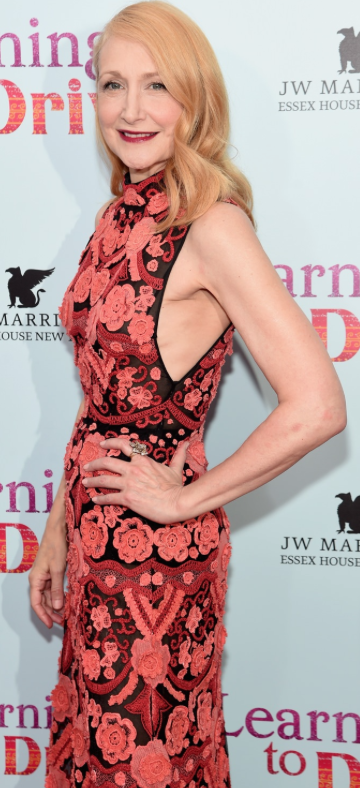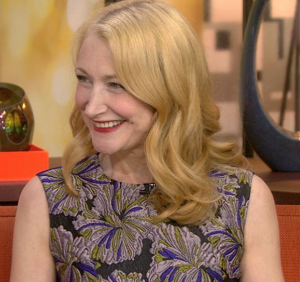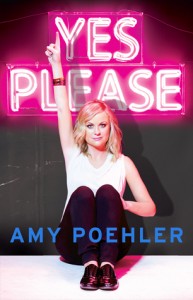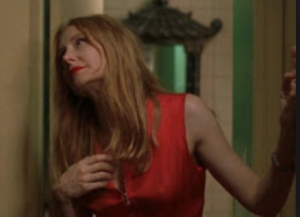 With her fog-horn voice and barely contained mischief, the luminous Patricia Clarkson is the sort of movie star who wows people who claim not to be wowed by movie stars. When I met her at the Hamptons International Film Festival, she was so funny, generous, and clever that I pounced at the recent opportunity to interview her about “Learning to Drive,” the Isabel Coixet-helmed adaptation of the eponymous Katha Pollitt essay. In it, Clarkson plays New York City book critic Wendy, who is newly on her own as her husband (Jake Weber) has left her and her daughter (Grace Gummer) has moved to a Vermont commune. A lifelong city kid, Wendy realizes she needs to learn to drive if she’s ever going to see her daughter again, so she enlists the services of Darwan (Ben Kingsley), a Sikh immigrant who drives a taxi by night and teaches driving by day. “Learning to Drive” is currently in theaters – and “Maze Runner: Scorch Trials,” in which Clarkson also appears, will open Friday.
With her fog-horn voice and barely contained mischief, the luminous Patricia Clarkson is the sort of movie star who wows people who claim not to be wowed by movie stars. When I met her at the Hamptons International Film Festival, she was so funny, generous, and clever that I pounced at the recent opportunity to interview her about “Learning to Drive,” the Isabel Coixet-helmed adaptation of the eponymous Katha Pollitt essay. In it, Clarkson plays New York City book critic Wendy, who is newly on her own as her husband (Jake Weber) has left her and her daughter (Grace Gummer) has moved to a Vermont commune. A lifelong city kid, Wendy realizes she needs to learn to drive if she’s ever going to see her daughter again, so she enlists the services of Darwan (Ben Kingsley), a Sikh immigrant who drives a taxi by night and teaches driving by day. “Learning to Drive” is currently in theaters – and “Maze Runner: Scorch Trials,” in which Clarkson also appears, will open Friday.
Although Clarkson’s publicist refers to her as Patty, I was too awed to use anything but the actress’s full name in audible italics whenever addressing her directly. It seemed appropriate; Clarkson speaks in audible italics as well – a raspy patois of spoken-word poetry and bawdy, feminist delight.
PATRICIA CLARKSON: I think we met at a backyard austere mansion party. It was very Hamptons.
LISA ROSMAN: We did, Patricia Clarkson! I can’t believe you remember! You were there for “Learning to Drive,” actually. [The film did the festival circuit last year.]
PC: Oh my god! I was just delirious. I mean, can you believe the roster of that film? There were so many incredible women involved. I have had many, many photos taken of me in my life but one from a screening of this film takes the cake. The women! I am with Katha Pollitt, [screenwriter] Sarah Kernochan, Isabel Coixet, [producer] Dana Friedman, and [editor] Thelma Schoonmaker. I can’t believe Thelma came on board! She said, ”Okay, I’ll take a break from working with Marty [Scorsese] and edit this film,” because she knew it was a great project.
LR: And the editing puts it on another level. It glides.
LR: Were you familiar with Katha’s essay beforehand?
PC: Yes, I worshipped this essay. I read The New Yorker [where it originally appeared] religiously. That magazine is a mild – no, it’s a pure – addiction. The piece resonated with me as I found it wonderful, funny, and odd. You know, a very New York story. And I loved Wendy. Then I found out it was going to be a movie and thought Sarah had done a beautiful job with the changes she had made in her screenplay.
LR: The changes were very cinematic.
PC: Yes! It says a lot that Katha has enthusiastically supported this adaption from the beginning.
LR: So you helped get the others involved?
PC: Yes, and this film took a long time to make. Most small films do – maybe not nine years like this one did, but a long time. They have many incarnations, nine lives. People get involved and people fall out. It’s the nature of this business and it requires many skins. Since I’d done “Elegy” with Isabel and Sir Ben, and we all had got on very well, I gave the script to them.
LR: Sir Ben seems a little less saintly when he’s performing with you. You bring out something different in him.
PC: [cackles] That’s because I’m such a sinner! We played lovers in “Elegy,” and if you want to get to know someone, play lovers – I mean, play it, don’t do it! [laughs] But, yes. The nudity and the sex and emotional scenes were something in that film. Isabel is quite brilliant. She always brings an elegance and an intimacy. What people don’t know is she’s an operator, like [director] Steven Soderbergh. She doesn’t miss a thing. She’s right there, not hidden in a tent or behind a video screen like most.
LR: Is this why the driving scenes in the film work so well?
PC: Yes, there’s a natural movement to her work. She’s very fluid. But the driving was part of what made it so difficult to get the film made. No one wants to do a movie with two middle-aged people in a car for most of the time.
LR: It seems the challenge too has been getting distribution. Once people see it, the film lands, but you have to get people to see it!
PC: Yes, the premiere was a hard-core crowd – intelligentsia, glitterati, many young people – and it resonated with them, even with my nieces, who are now old enough to see everything I do.
LR: And you do plenty of nude scenes in your work!
PC: It is shocking to me that this still shocks people.
LR: Okay, you are the reigning queen of adaptations. Just a partial list of ones in which you have appeared includes “The Maze Runner,” “One Day,” “Easy A,” “All the King’s Men,” “The Old Man and the Sea,” “Joe Gould’s Secret,” “The Green Mile,” “The Safety of Objects,” “Elegy,” “Carrie,” and, hilariously, “Spencer: For Hire”!
PC: [bellows happily] SPENC-ER!
LR: Are you drawn to adaptations in particular? You strike me as a person who really loves books.
PC: Yes. I’m drawn to great stories – not that I haven’t experienced great original stories – but I’m very drawn to published work. Most of my friends are writers and I greatly value the written word although I can’t even write a postcard.
LR: Are there any that you’d like to develop?
PC: Well, not right now. I’m concentrating on developing a movie about Tallulah Bankhead right now. It’s a killer, with a beautiful script. I just have to get all the right elements to do it.
LR: So what are you reading right now?
PC: You see, when I am doing a show and am in a character, I can’t read fiction. So I prefer biography. I just finished the Amy Poehler book. She’s such a badass. What does she say? “If you don’t eat pussy, keep walking.” It’s beyond sublime. And I will tell you this: I worship Doris Kearns Goodwin. I actually read that whole Bully Pulpit book!
LR: What books did you like as a kid?
PC: I loved Beverly Cleary. I couldn’t get enough of her. I mean, Ramona and Beezus! Those were the names of our dogs growing up! Beverly Cleary needs to be brought back in a major way. I liked Nancy Drew too.
LR: Okay, a feminist lady question.
PC: Oh, god. Yes.
LR: Kudos for your comment to The Washington Post about how it drives you crazy that there aren’t more unlikeable female characters. But even though there aren’t many of these roles, you manage to play a lot of these beautifully complicated characters who are – well, I’m not going to say middle aged –
PC: Let’s say grown-up. As women we are so categorized, so either-or that it’s rare that we get to play really human. Tragic and comic on a razor level. Take Wendy’s divorce. It’s a gray area. We women are not always perfect, and why is vilification of just one person in a breakup necessary? You know, my generation are the women who reaped the benefits of the women before us making tremendous sacrifices in their lives. We are breadwinners and we have children – we have surrogate children, adopted children, we have IVF. Things came into play with us. And what happens if you’re the smartest woman in the room, someone who “has it all,” and you still do stupid things? That is what I like to explore.
LR: What’s interesting is that you are one of the few female actors around who will directly address what it means to be unmarried and not have kids.
PC: Getting married and having kids was never my plan. Of course all I play is married women, and I do bring an objectivity to those roles because I am an observer of so many marriages from a distance. And I have had some serious loves in my life that have come close to marriages without the certificate. But marriage was never something I strived for. I am a free spirit and I have been since I was a very young girl. I am the goat going up the mountain and I like being alone on the mountain. We women who have never been married and who don’t have children are a subclass. We are still a category that is marginalized sometimes and in subliminal ways that are shocking to me. That’s why I talk about it. I am proud of the fact that I have never married. It’s an odd thing to me that interviewers – often female interviewers, actually – have a quiet hesitancy when the topic comes up. [Imitates an interviewer] “Let me put on my gloves before asking you this question. So you’re, you’re [whispers] single?” [Cackles.] It’s as if they might catch it!
LR: [cackles] They might, Patricia Clarkson!
PC: It’s quite shocking! [Cue gales of laughter.]
LR: So, Louisa May Alcott –
PC: Whom I adore.
LR: Yes! Well, she had this quote, “I’d rather be a free spinster paddling my own canoe.” It’s almost as if 100 years ago it was more accepted that women might not choose to marry since marriage made them the possession of their husbands. They were more obviously choosing freedom.
PC: Yes. Our validity as single women wavers through time in the public eye. Shocking!
LR: Okay. You came more fully into the public eye in your thirties and forties, right at the age when so many women start getting written off in Hollywood. Why do you think this is?
PC: Well, I went to Yale Drama School, from which you graduate at twenty-five. So I didn’t even hit the market until then. And I had this voice, which is not exactly an ingénue voice. [laughs.] Then as I grew as a woman and as an actress everything started to meet for me. It’s only now that people are seeing me as sexual and beautiful and, uh, naked! I mean, I was just naked for a year in a play [Elephant Man] opposite Bradley Cooper and Alessandro Nivola! [Laughs wildly] My friends were like: I hate you!
LR: I hate you too, Patricia Clarkson. Well, actually, I can’t. You’re a patron saint – wait, we can’t call you a saint, we agreed you’re a sinner – let’s say you are a role model of integrity, especially in your work. You disappear so fully into your roles.
PC: I always want to be true to the character. There are ghosts of me, fumes of me, memories, even traumas that have to be present to play certain characters. I have to give them emotional lives and my emotional life is the only one there to draw on. It’s painful but that’s the journey to make.
LR: What about “High Art”? As [German lesbian heroin addict] Greta, you were so different than how you usually are.
PC: That was [director] Lisa Choledenko trusting me. I was thirty-eight, thirty-nine. You can research about drug addicts, but I was channeling a bit. You have to channel.
LR: Okay, that reminds me. Here is a question I promised my friend I would ask if I ever got to talk to you again.
PC: I’m ready.
LR: How do you channel so much beauty and luminescence into a mere earthly vessel? How it is possible to be as awesome as you are and not trail actual fireworks in your wake?
PC: That is so lovely! [Falls into such gales of laughter that she loses her breath.
This was originally published in Word and Film.

